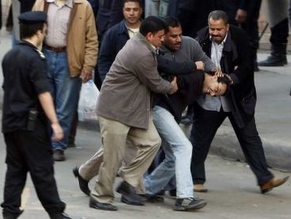|
World Jewish News

Plainclothes police arrest a protester during clashes in Cairo January 26, 2011. Photo by: Reuters
|
Egypt vows to question four government officials, in bow to opposition
07.02.2011, Israel and the World Egyptian judicial officials have promised to start questioning three former ministers and a senior ruling party official on Tuesday, in the government's latest concession aimed at curbing the unrest that has wracked the country over the last two weeks.
The government is also expected to release a Google marketing manager who was detained during the anti-government demonstrations calling for the ouster of President Hosni Mubarak, who has ruled the country for 30 years.
Meanwhile, Mubarak's new cabinet was to meet Monday for the first time since the government was reshuffled in the wake of the mass protests. Mubarak, who has refused calls to step down before September polls, has tried to focus on restoring order.
But protesters, camped out in Tahrir Square in the heart of Cairo, have vowed to stay until Mubarak quits, and hope to take their campaign to the streets on Tuesday and Friday.
Vice President Omar Suleiman met Sunday with representatives of the various opposition groups, including the outlawed Muslim Brotherhood, to begin negotiations over reforms and a transition to democracy.
The opposition groups said that the meeting was held in a positive atmosphere, but reiterated that they would not cease their protests until Mubarak and his guard were removed from power.
Suleiman, Egypt's former intelligence chief who is leading the government's management of the crisis, offered a series of new concessions, saying the government would no longer hamper freedom of press and won't interfere with text messaging or the Internet.
He proposed setting up a committee of judiciary and political figures to study proposed constitutional reforms that would allow more candidates to run for president and impose term limits on the presidency, the state news agency reported. The committee was given until the first week of March to finish the tasks.
The offer included a pledge not to harass those participating in anti-government protests, which have drawn hundreds of thousands at the biggest rallies.
One of the biggest fears of protesters is that if Mubarak or his close confidant, Suleiman, remain in power, they will exact revenge for the humiliating demonstrations by rounding up protesters and torturing them. Many protesters have reported seeing undercover security forces in the crowds every day, photographing the demonstrators with cell phone cameras.
Suleiman's offer to eventually lift emergency laws with a major caveat - when security permits - would fulfill a longtime demand by the opposition. The laws were imposed by Mubarak when he took office in 1981 and they have been in force ever since. They give police far-reaching powers for detention and suppression of civil and human rights.
Suleiman also proposed opening an office that would field complaints about political prisoners, according to the state news agency. He promised measures to fight corruption and to prosecute those responsible for the unexplained disappearance of police from Cairo's streets more than a week ago. And the government agreed to set up a committee including independent figures and members of the youth movement to monitor the "honest implementation" of all the new agreements.
Some prominent figures from Egypt's elite have suggested that there is a deliberate attempt by the regime to cling to power by offering just enough to satisfy some established opposition groups like the Brotherhood.
Abouel Ela Madi, an ex-Brotherhood member, said the regime hopes to draw the organization away from the other protest groups.
"If the regime manages to influence the Brotherhood, it will have a shattering effect. A bulk of the protesters belong to the Brotherhood and thus their talks might play a negative role in foiling the completion of the revolution," he said. "I hope they don't make this mistake."
Of all the opposition groups that met with Suleiman, the Brotherhood stands to gain the most. There have been no known discussions between the group and the regime at this level since Mubarak took power in 1981.
The Brotherhood won 20 percent of parliament's seats in 2005 by fielding candidates as independents, but thousands of its members were arrested in crackdowns over the past decade and it failed to win a single seat last year in elections that were marred by fraud.
The Brotherhood's potential rise is a key concern of the U.S. and Israel, countries that have depended on Mubarak as an ally in the Arab world.
The Brotherhood aims to create an Islamic state in Egypt but insists it would not rescind Egypt's 1979 peace treaty with Israel and would not take hard-line measures such as forcing women to cover up in public.
The Brotherhood did not organize or lead the protests currently under way.
It ordered its supporters to take part a few days after they began, sensing that the protesters, mostly young men and women using social networks on the Internet to mobilize, were able to sustain their momentum. Now the Brotherhood's followers appear to be growing in Cairo's Tahrir Square, the epicenter of the uprising.
Suleiman and Mubarak have both blamed the Brotherhood for fomenting the unrest, which turned violent for a time early last week when Mubarak supporters tried to push protesters out of the square. But opening talks with the Brotherhood is a tacit recognition by the regime of its role in the ongoing protests as well as its wide popular base.
Haaretz.com
|
|
